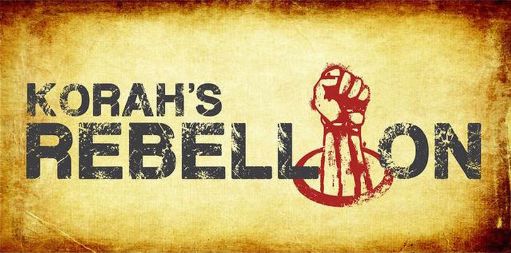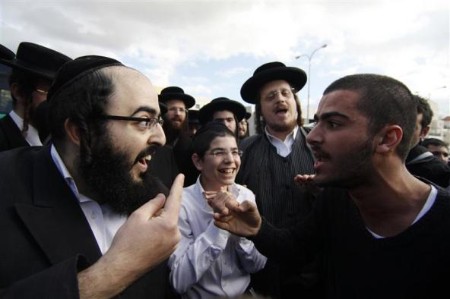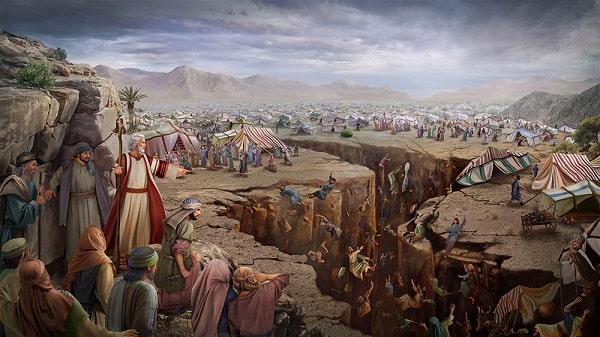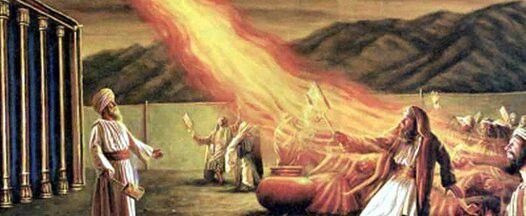MUTINY AGAINST MOSES
In last week’s study (Shlach L’cha), we could already see the seeds of rebellion being sown within the community of Israel as, in fear and unbelief, the Israelites threatened to select a leader (other than Moses) and return to Egypt. The seeds of revolt had already been planted and were just waiting to break out into full blown rebellion.
In this week’s Torah study, the rebellion continues with the mutiny against Moses’ leadership by a man named Korach קֹרַח, which means ‘baldness, ice, hail, or frost’. The Torah portion opens with ‘Vayikach Korach’ (‘And Korach took...’) – an act of selfishness which led to division and disaster in Israel.
Basically, two groups expressed discontentment with the leadership of Moses and Aaron: Datan & Aviram (from the tribe of Reuven) led one group of rebels and Korach (a Levite) led the other. In the end, God vindicated Moses and Aaron while severely punishing those who joined the rebellion. This was necessary to prevent the growth of anarchy which would have destroyed Israel’s national unity.
Today, Israel still struggles to maintain unity in a nation filled with such diverse ethnic and religious populations. |
|
| Israeli secular and religious Jews 'dialogue' in Beit Shemesh |
|
Parashat Machloket (The Danger of Strife)
This Torah study is also called the ‘Parashah of Machloket’ (strife) since Korach created strife within the people of Israel with his rebellion, discontent and dirty politics. Wicked people sow strife wherever they go; a negative quality which leads to their ultimate destruction.
“ A worthless person, a wicked man... he sows discord.
Therefore his calamity shall come suddenly;
Suddenly he shall be broken without remedy.” (Proverbs 6:12,14,15)
God loves peace and His Holy Spirit dwells in peace (shalom). Causing strife, discord and division between brothers is one of the things that God hates and calls an abomination:
“These six things the Lord hates, yes, seven are an abomination to Him:” God then lists six things He hates and ends with the last one: “...and one who sows discord among brethren.” (Proverbs 6:16,19)
It is so important that we do whatever we can to maintain ‘shalom bayit’ (a peaceful home). Strife in families will cause all kinds of trouble and prevent many of God’s blessings from reaching us. “Better is a dry morsel and quietness with it than a house full of feasting with strife.” (Proverbs 17:1)
What causes strife? It is the sin of pride: “He who is of a proud heart stirs up strife.” (Proverbs 28:25) This deadly disease of the soul cannot co-exist with the virtue of humility. |
|
The Power of Unity
Unity is precious and powerful - it is where God commands His blessing: “Behold how good and how pleasant it is for brethren to dwell together in unity! It is like the precious oil upon the head, running down on the beard, the beard of Aaron...(oil represents anointing)...For there (upon unity), the Lord commanded the blessing – Life forevermore.” (Psalm 133:1-3)
This is a well known Hebrew song to which we also dance,” Hinei Matov U’manayim, shevet achim gam yachad.” But we must do more than just sing and dance unity, we must live it! We must earnestly pray for unity ‘that there be no divisions among us – that we be perfectly united in mind and thought” (1 Corinthians 1:10)
|
|
| Jewish and Arab Israeli girls dance together at Messianic Shavuot gathering |
|
Bad Company Corrupts Good Character
With an utter lack of humility, Korach, a Levite, joined forces with Datan and Aviram, from the tribe of Reuven, along with On, son of Pelet and 250 chieftains from the Israelite community to rise up against Moses.
The rabbis consider this the most perilous moment for Israel during its wilderness journey; and Korach is remembered as the Torah’s professional troublemaker and the most famous rabble-rousing Jew of all time.
What circumstances aided their joint conspiracy? According to rabbinic commentary, the tribes of Reuven and Levi marched side by side in the desert, giving them ample opportunity to discuss their grievances and come up with a plan. We must be so careful about with whom we choose to walk closely!
Pointing to the negative example of Korach as a ‘peddler of hatred’; the rabbis teach, ‘al titchaber im rashah’ (don’t befriend evil people). This is one of the main lessons that we may learn from this portion of the Torah: “A companion of fools will suffer harm.” (Proverbs 13:20)
King Solomon (Shlomo), whose very name comes from the Hebrew word for peace (shalom), also wrote these words of wisdom,
“Wisdom will save you from the ways of wicked men, from men whose words are perverse, who have left the straight paths to walk in dark ways, who delight in doing wrong and rejoice in the perverseness of evil, whose paths are crooked and who are devious in their ways.” (Proverbs 2:12-15)
The New Testament Scriptures also agrees with the rabbis and King Solomon’s advice: “Do not be misled. Bad company corrupts good character.” (1 Corinthians 15:33) |
|
the earth swallows up korah and all his followers
|
|
Going Up... and Down...
Many of the people of Israel were deceived into siding with the rebels - the enemies of God’s chosen leadership (Moses & Aaron) - just as many people today are choosing to side with the enemies of God who come against Israel.
Moses called Datan and Aviram to go up (aleh); but they replied ‘loh na’aleh’ (we won’t go up). “And Moses sent to call Datan and Aviram the sons of Eliab, but they said, “We will not come up!”(Numbers 16:12)
Ironically, those who refused to ‘go up’ to negotiate peace with Moses ended up ‘going down’ to their deaths. The earth swallowed them up alive and they went down to Sheol (place of the dead). “So they and all those with them went down alive into the pit; the earth closed over them, and they perished from among the assembly. “ (Numbers 16:33)
Also, of the 250 'men of renown' who joined with the rebels, they also perished by fire: "And a fire came out from the Lord and consumed the two hundred and fifty men who were offering incense." (Numbers 16:35) |
|
For our God is a consuming fire. (Hebrews 12:29)
|
|
Come out of Her My People (Flee Rebellion)
The people of Israel had to make a choice – to join with the rebels or to get out of there - and fast! Moses spoke to the congregation of Israel, “Depart, I pray you, from the tents of these wicked men, and touch nothing of theirs, lest ye be swept away in their sins’. (Numbers 16:26)
The same warning is being proclaimed today for God's people to separate themselves from idolatry, rebellion and paganism, since this is not the true worship He desires in spirit and truth. The first commandment is to have no other gods before Him. We, the covenant people of God, cannot keep one foot in His ways, and one foot in paganism and idolatry. This is a dangerous mixture.
God warns His people to ‘Flee Babylon!” “Come out of her, my people, lest you share in her sins, and lest you receive her plagues.” (Revelation 18:4) Babylon represents all false religion and rebellion.
This 'New Testament' warning sounds much the same as that with which Moses warned the children of Israel. The same alarm is being issued to the Body of Messiah, “Therefore come out from them and be separate says the Lord. Touch no unclean thing, and I will receive you.” (2 Corinthians 6:17)
The vessels of the Lord must be pure and holy, not contaminated and defiled with rebellion. We must determine to keep ourselves set apart, no matter how high the cost to separate from the rebels and leave that place of rebellion: “Depart, depart, go out from there! Touch no unclean thing! Come out from it and be pure, you who carry the vessels of the Lord.” (Isaiah 52:11) |
|
Come out of Her My People - Flee Babylon
by Hannah Nesher
This special 'Book of the Month' offer will help explain the nature of spiritual Babylon and how we can keep ourselves 'set apart' (kadosh).
Order your copy for $20 + s/h HERE
Or download a digital copy for $5 HERE |
|
|
|








No comments:
Post a Comment